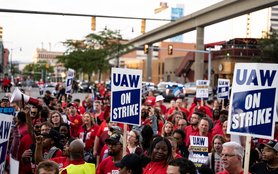The impact of slavery and past and present racism continues to undermine the economic well-being of Black communities--but ending poverty is not as hard as you think.
This year marks the fourth Juneteenth since George Floyd’s murder compelled people beyond Black Americans to recognize the day that the last enslaved people were informed of their emancipation.
We must be honest about the fact that precious little has improved since 2020, despite grand promises to build economic equity and eradicate white supremacism from our politics and institutions.
Juneteenth is traditionally a day of celebration for Black people. It should also be a moment of reflection, to assess where our country still falls short of redressing the harms of slavery and past and present racism.
The Black employment rate has improved, but continues to fall short of the general population. Wages for low-income workers—a group that disproportionately comprises Black people—have increased, but rising prices have offset the gains. And when it comes to the safety of Black Americans to live their daily lives without fear of knocking on the wrong door or walking to the grocery store, it feels as though we’re moving backward.
There is reason to be hopeful: we have the power to create a different future. But to do so, we must go beyond platitudes and empty promises and demand comprehensive, structural changes to our systems and to how we think and talk about them.
A proven solution
I run a nonprofit that serves residents of Mississippi’s subsidized housing complexes; nearly all of my constituents are Black Americans living in extreme poverty. I’ve had the opportunity to test out an approach that has the potential to reshape our discriminatory social safety net: give people cash.
This may sound like an overly simple solution, but it’s just common sense. Though poverty has many dimensions, lack of money is at the heart of it. Getting more money into people’s hands is an obvious solution—and it’s proven to work.
We call our program the Magnolia Mother’s Trust. Since 2018, we’ve been providing $1,000 a month for a year to Black mothers living in extreme poverty. The results have been nothing short of transformative.
In our latest cohort, mothers reported that their children were happier, and that mothers and children were able to spend more time together. Their ability to regularly provide new clothing and shoes for their children rose more than 14 percent. And they saw significant improvements in their long-term outlook, with 79 percent feeling more hopeful about their futures and 82 percent feeling more hopeful about their children’s futures. A longitudinal study across several of our cohorts produced a hopeful finding: many of the improvements lasted for years after the payments ended.
Tiyonda, a mother in our program last year, used her guaranteed income to pay for day care for her two kids so she could go back to work as an elder care provider. Before she received the payments, she was only able to work part time. Being able to afford day care meant she could take on a full schedule, helping her consistently care for her children and work toward her nursing degree.
Elsie, a mom from our very first cohort, says she still feels the impact of the program years later. She was able to fulfill her dream of moving out of subsidized housing, and to buy a more reliable car. She also felt the cash provided the opportunity to live rather than just survive: she used some of her funds to travel with her kids.
Same idea on a national scale
In 2021, the Biden Administration expanded the Child Tax Credit, providing every lower-income parent in America up to $300 per child per month. The program slashed child poverty nearly in half, and because so many Black children are living in poverty, it had a disproportionate impact on Black families.
Like the Magnolia Mother’s Trust, the Child Tax Credit provided families with a guaranteed income, but it came to an abrupt halt at the end of 2021. When Congress allowed the Child Tax Credit to expire, poverty rates shot up more than 40 percent in a single month.
These results make it clear: poverty is a public policy choice. And it is a choice that disproportionately harms Black Americans.
Guaranteeing income for all Americans is a significant step toward addressing the harms that slavery and racism have inflicted on Black communities. This Juneteenth, my hope is that we embrace a vision of a country in which Black Americans finally experience the joy, equality, and opportunity our country has denied us for far too long.



